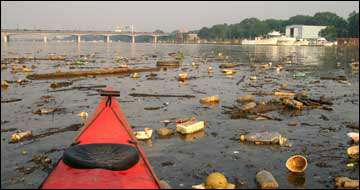|
Online Feature
A Summit on River Trash
Jack Greer

Credit: Skip Brown |
PLASTIC BOTTLES. CANDY WRAPPERS. BALLPOINT PENS. So much of what we cast off day-by-day ends up in the Potomac River and its urban tributary, the Anacostia.
Who's responsible for all this trash? Given all the gutters, culverts, and storm drains that send debris down the river, how can we stem this trashy tide?
Tough questions, but that's not stopping Tracy Bowen. Bowen is the Executive Director of the Trash-Free Potomac Watershed Initiative for the Alice Ferguson Foundation. For four years she's thrown her energies into a Trash Summit on the shores of the Potomac. Starting in 2005, the Foundation also penned a Trash Treaty and began collecting signatures from the region's political powers. Governors. Mayors of local towns, including the District of Columbia and Alexandria, Virginia. County executives from Prince Georges, Montgomery, and other counties. State legislators and Congressional leaders, including Steny Hoyer and Chris Van Hollen. And many, many more.
The Treaty commits the region's leaders and jurisdictions to a "trash-free" Potomac watershed (which includes the Anacostia) by 2013. That's not far away.With a sense of urgency, nearly 300 attendees came together in October 2009, for the fourth annual Trash Summit to reaffirm their commitment to clean up the Potomac and its watershed.
According to Representative Chris Van Hollen (D-MD), the idea is simple. Clean up the most visible problem that faces the Potomac and Anacostia as a first step to restoring the ecological health of the rivers. But if the Summit is any indication, cleaning up trash will prove complicated.
First there's the public. The nonprofit Alice Ferguson Foundation, along with others, regularly rounds up citizen volunteers to pull tires and trash out of the rivers. The Foundation says since 1988 it's worked with more than 30,000 volunteers and 220 partners to remove 1,022 tons of trash from the Potomac watershed. But there are many more who still don't feel a sense of responsibility for keeping trash out of the river in the first place.
Then there are businesses and jurisdictions. The 2009 Trash Summit offered a range of panels on laws, regulations, and business practices. Panelists called for the reintroduction of bottle bills in all the Bay states. They called for new regulations or incentives to reduce plastic bags and Styrofoam. For new ways to handle compost and kitchen waste. For better ways to handle stormwater and keep it trash free.
Experts noted that the Anacostia is the only river on the eastern seaboard that has a TMDL for trash — a permit that controls "total maximum daily loads" of trash in the watershed. Hamid Karimi, of the District of Columbia's Department of the Environment, wondered whether it's time to go beyond a jurisdiction-by-jurisdiction approach. What about a trash-specific TMDL for the whole Potomac watershed?
Such innovative thinking will likely become important as 2013 draws closer.
|
The Potomac Watershed Trash Treaty commits signers to achieving a Trash Free Potomac by 2013, and to:
- Support and implement regional strategies aimed at reducing trash and increasing recycling;
- Increase education and awareness of the trash issue throughout the Potomac Watershed;
- Reconvene annually to discuss and evaluate measures and actions addressing trash reduction.
|
Following the October conference, Washington, D.C. continued to break new ground in its fight against trash in the Anacostia. On January 1, 2010, the District put in force a law that targets plastic bags. The new law charges shoppers five cents for each disposable bag that businesses hand out, but offers a rebate when they bring their own. The revenue generated goes toward a new Anacostia River Protection Fund. The money will help to provide reusable bags, educate the public about litter, and clean up the river.
The next Trash Summit will take place on Thursday, September 23, 2010, at The Sweden House, 2900 K Street NW, Washington, DC 20007. To learn more about that meeting, as well as the Trash-Free Potomac Watershed Initiative and results of the 2009 Trash Summit, visit the web at www.fergusonfoundation.org.
|